#deluge of al-aqsa
Text
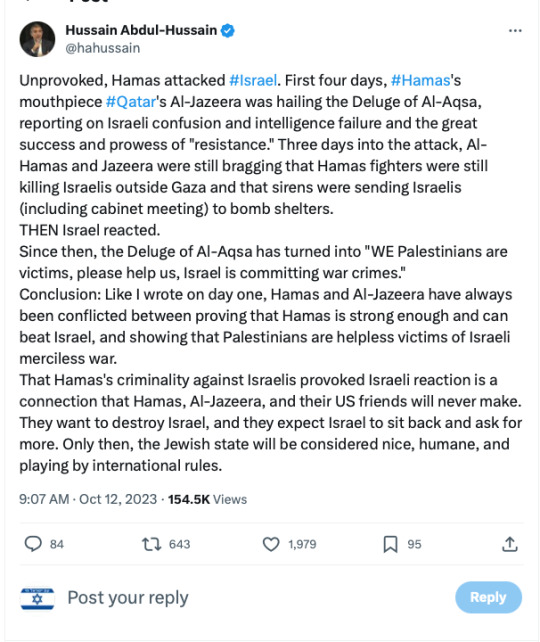
Source
266 notes
·
View notes
Text
Correlations b/w Pearl Harbor, 9/11 and Current Israel/Palestine Conflicts
I kept getting messages on how the recent event in Israel ties into the bigger picture. To be honest, how this event is unfolding is very much energetically tied to a “Pearl Harbor” level incident that may well escalate into what transpired after the 9/11 attacks. Also, not forgetting that the current transit VenusStar Point (VSP) in Leo is also around those degrees in square also to Uranus in…

View On WordPress
#9/11#astrologers of instagram#astrologersofinstagram#astrological correlation studies#astrology#chiron#horoscope#iran#leo#Moon#operation al-aqsa deluge#palestine#part of fortune#partoffortune#pearl harbor#professional astrologer#professionalastrologer#saturn#uranus#venus#venus star point#venusstar#venusstarpoint#vertex#worldwar3
4 notes
·
View notes
Text
By Stephen Millies
Seventy years ago the most notorious “terrorist” — as labeled by the U.S. and British media — was not a Palestinian, an Arab, or a Muslim. The person demonized was Jomo Kenyatta, who became the first president of independent Kenya. At the time, Kenyans were fighting for their freedom from British colonialism.
#Kenya#Palestine#Mau Mau#Jomo Kenyatta#terrorism#Israel#Britain#imperialism#FreePalestine#Struggle La Lucha
178 notes
·
View notes
Note
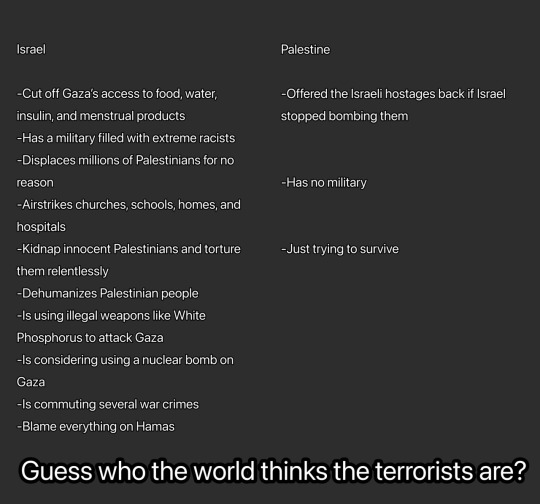
Quote: "We must teach Israel a lesson, and we will do it again and again. The Al-Aqsa Deluge [the name Hamas gave its 7 October onslaught - ed.] is just the first time, and there will be a second, a third, a fourth. Will we have to pay a price? Yes, and we are ready to pay it. We are called a nation of martyrs, and we are proud to sacrifice martyrs."
Point 1. incorrect not like they supply much of either anyhow

They do about half the electricity, which the other half should be fine for what is actually needed, not like there's any reason to keep on sending it there for the people that are trying to kill them or anything.
Maybe they should send some ammo too.
Point 2. bullshit, the IDF is a multicultural military with people of all stripes in it from Israeli Jews to Israeli Arabic Muslims, which will probably come in handy with the apartheid lie I assume will show up soon too. Jewish folks are the only group in Israel with male and female compulsory service, Arabs have no compulsory service they sign up all of their own accord.
Gonna be racists in any military, but filled is just going to be a really bad way to put it.
3. this covers churches and schools any civilian structure really
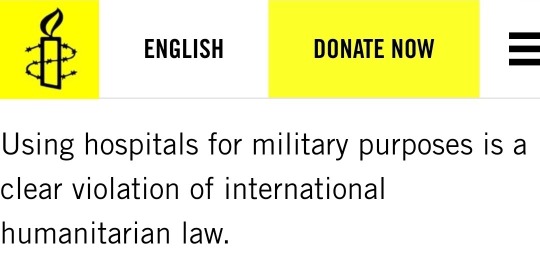
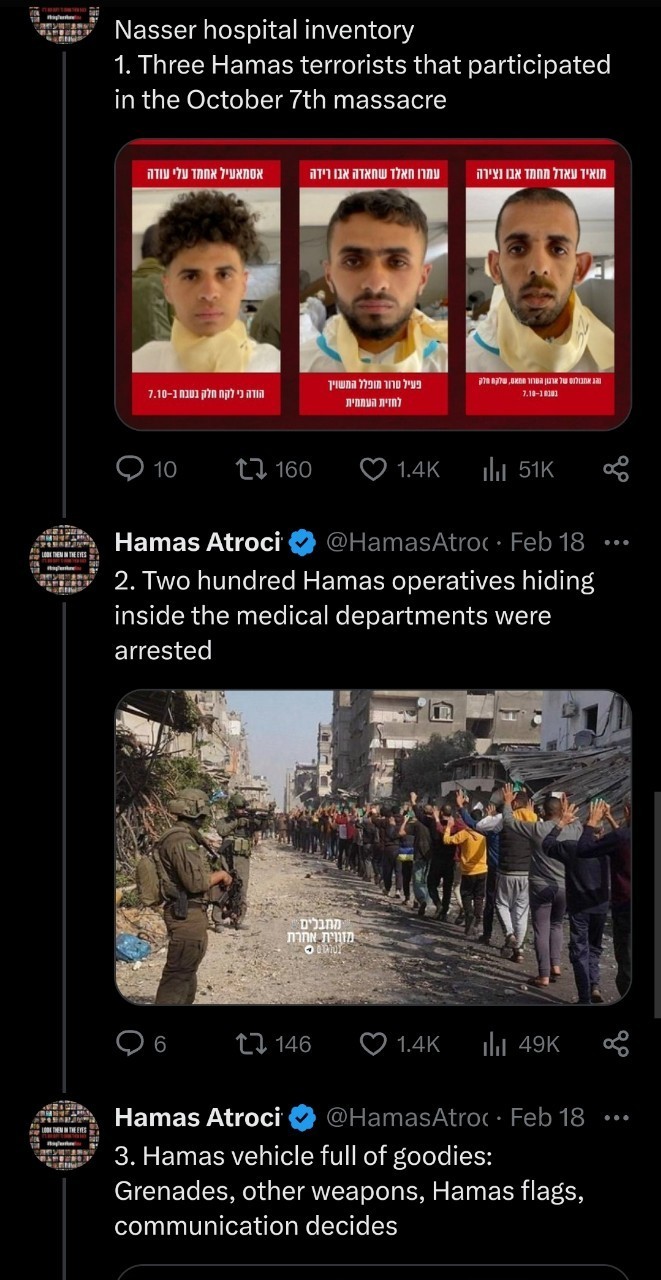
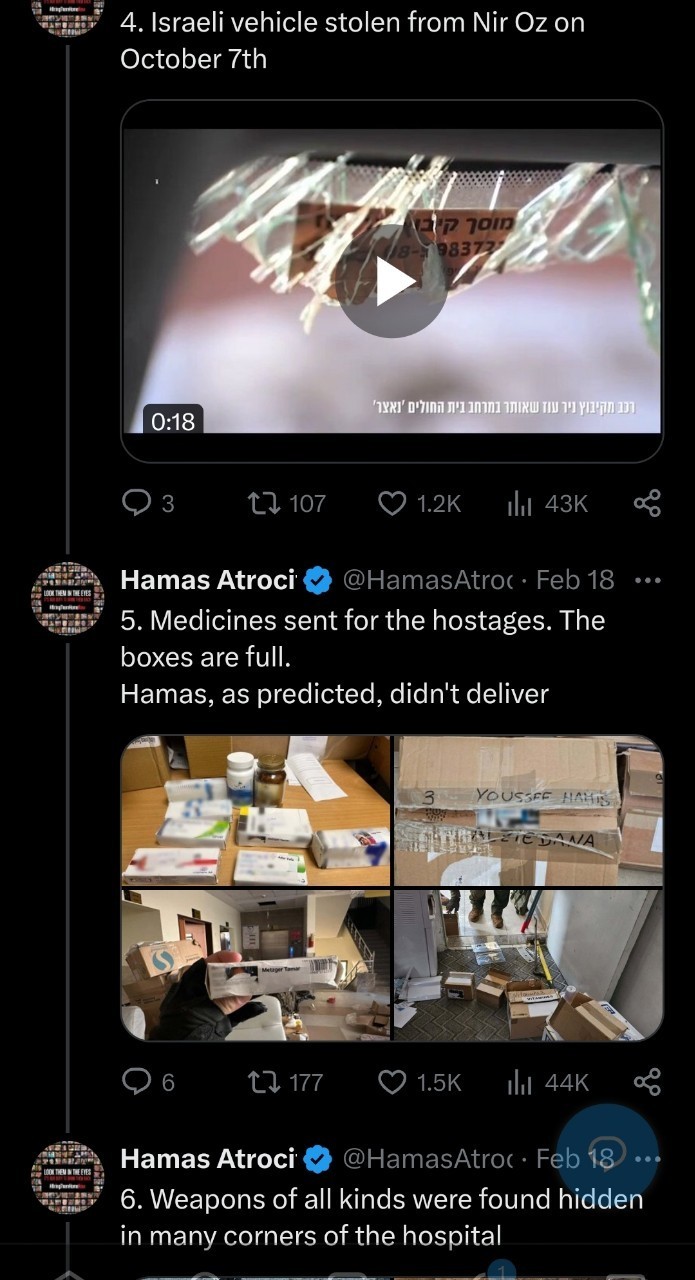

4 white phosphorous isn't illegal, also those images were from Syria when assad was using the stuff if they're the ones I'm thinking of.
5. bullshit, but if you have the stomach you could go ahead and see what hamass did on october 7 by clicking on this link, I strongly advise against it, it will likely make you sick to your stomach and haunt your dreams.
6. now you're just making things up
7. Every thing hamass has done starting with the attack on 10/7 has been a war crime, and before as well considering all the unguided rockets they send in without any concern where they land and if things are military targets or not.
Their idea is to sow terror and fear, thus that would be why the world considers them a terrorist organization.
As for the other list,
1.Bullshit, see point one about continuing and then maybe look up what they actually wanted in exchange
2. from 2014 even, just like the vox headline up there, so it's not like anyone can claim this is new information
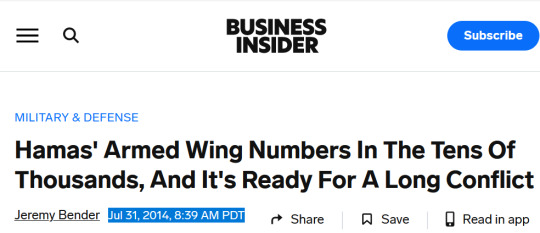

Now then later on they'll remove the uniforms and put on civilian clothing, makes it easier for them to stand in the middle of a crowd of people and start shooting because some guy in fatigues is a dad giveaway that someone is gonna start shooting.
(that's another war crime btw) (So is taking civilian hostages, which has been established that they did)
3. They're trying to murder every single person in Israel, and then if they can manage that they'll expand and start hunting down every Jewish person across the globe, hamass has been quite clear about this and for some reason nobody wants to believe them.
If they just wanted to survive they'd stop trying to kill Israeli's at every opportunity.
You know like the ceasefire everyone was clamoring for that happened in November.

They have a incredibly terrible way of showing they just want to survive, if that were the case they wouldn't do this every fucking time they get a ceasefire.
Also see point one about doing 10/7 repeats for as long as they can.
17 notes
·
View notes
Text
Fadwa Tuqan

Hello friends!
For last week's recommendation I wanted to highlight the writing of a quintessential Palestinian feminist poet who devoted her work to criticizing patriarchy, settler colonialism, and imperialism alongside expanding the bounds and themes of free-verse poetry across the Arab world: Fadwa Tuqan
Born in 1917 in Nablus, Tuqan came from a distinguished and influential Palestinian family. She was taught by her brother Ibrahim Tuqan, himself a historically significant Palestinian poet, until she was 13. He was the first to expose her to poetry and provided her the intellectual foundation that would carry her to studying English and Literature at Oxford.
Growing up in the context of Palestine's increasing colonization post-Balfour Declaration, Fadwa developed a deep sense of national identity and a strong connection to her homeland through nearby intellectual circles. The Nakba also impacted her development as it forced Nablus into assuming the cultural mantle for Palestinian cities under occupation, and also provided an opening to criticize feudal and patriarchal structures in her community.
Both themes of women's liberation and anti-colonialism cemented themselves in her earliest poetry collections, intensifying after Israel's occupation of Nablus after 1967. She tragically passed away in 2003 during the heights of the Al-Aqsa Intifada as Israel bombed her hometown of Nablus.
I want to end by highlighting "The Deluge and the Tree," encapsulating her view of a resilient Palestinian people and land:
When the hurricane swirled and spread its deluge
of dark evil
onto the good green land
'they' gloated. The western skies
reverberated with joyous accounts:
"The Tree has fallen!
The great trunk is smashed! The hurricane leaves no life in the Tree!"
Had the Tree really fallen?
Never! Not with our red streams flowing forever,
not while the wine of our thorn limbs
fed the thirsty roots,
Arab roots alive
tunneling deep, deep, into the land!
When the Tree rises up, the branches
shall flourish green and fresh in the sun
the laughter of the Tree shall leaf
beneath the sun
and birds shall return
Undoubtedly, the birds shall return.
The birds shall return.
#book blog#book review#bookblr#decolonisation#free palestine#palestine#settler colonialism#anti colonialism#fadwa tuqan#poetry#poem#feminism
11 notes
·
View notes
Text
Les Brigades Al Qassam révèlent le système de missile artisanal « Rajum » qu'elles ont utilisé lors de la frappe d'ouverture comme tir de couverture pour permettre aux combattants de traverser les territoires occupés pendant la bataille #Deluge d'al Aqsa
#israel#israël#sionisme#sioniste#gaza#al qassam#hamas#palestine#stand with palestine#resistance#occupation#apartheid#crimes#terrorisme
6 notes
·
View notes
Text
The ideology of war in Ukraine and Israel
by Thierry Meyssan, https://www.voltairenet.org/article220527.html 14 Mar 24
The wars in Ukraine and Gaza are more similar than you might think, at least if you know their histories. The Ukrainian war didn’t start with the Russian military operation, but with the massacres in the Donbass, while the Gaza war didn’t start with the Al-Aqsa deluge, but 75 years earlier with the Nakhba. In the long…
View On WordPress
0 notes
Text
Israel Hamas at war, today's news January 6 | Direct
“The place and time” of Iranian revenge for the double attack in Kerman will be “chosen” by the Islamic Republic: President Raisi says so, participating in the funerals of the victims and assures that the Al Aqsa deluge operation will lead to the end of Israel. Telegram of condolence from Pope Francis. The leader of the Lebanese Hezbollah, Nasrallah, speaks: “We will not remain silent” after the…
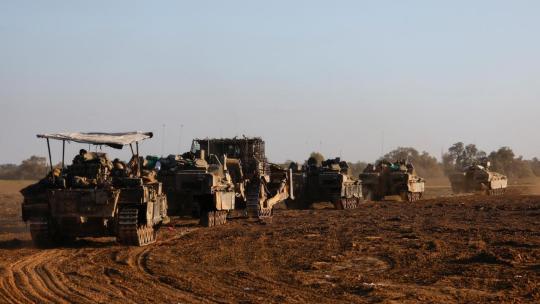
View On WordPress
0 notes
Link
0 notes
Text
BUREIJ REFUGEE CAMP, Gaza Strip (AP) — The gray film covering the faces of children rushed to Al-Aqsa Hospital in central Gaza Thursday made it hard to distinguish between the living and the dead.After two Israeli airstrikes flattened an entire block of apartment buildings in the Bureij refugee camp and damaged two U.N. schools-turned-shelters, rubble-covered Palestinians big and small arrived at a hospital too packed to take them.Tiny, motionless bodies lay flat against the hospital’s hard floor. A small boy bled out onto the tiles as medics tried to staunch the flow from his head. A baby lay next to him with an oxygen mask strapped on — covered in ash, his chest struggled to rise and fall. Their father sat beside them.“Here they are, America! Here they are, Israel!” he screamed. “They are children. Our children die every day.”More than 3,700 Palestinian children and minors have been killed in just under a month of fighting, and bombings have driven more than half the territory’s 2.3 million people from their homes, while food, water and fuel run low.As Israeli troops encircle Gaza City and press ahead with a ground offensive, the death toll is expected to grow.The war was triggered by the Hamas militant group's brutal cross-border attack on Oct. 7, which killed some 1,400 people in Israel and took some 240 others hostage. More than 9,000 Palestinians in Gaza have been killed since then, according to the Health Ministry in Hamas-ruled Gaza. It is the fifth and by far deadliest war between the two enemies.It was not immediately clear why Israel targeted Bureij, which is located in central Gaza in an area where Israel has urged people to go to stay safe from heavy fighting further north.The army said that airstrikes across Gaza had targeted Hamas military command centers hidden in civilian areas. But its statement did not mention Bureij specifically. Israel accuses Hamas of using civilians as human shields.The Bureij strikes Thursday killed at least 15, Gaza’s Civil Defense said. It said dozens of others were believed to be buried in the rubble.Paramedics and first-responders have struggled to evacuate the injured and the dead due to crippled infrastructure and fuel shortages. Instead, casualties flow into hospitals in the arms of relatives, neighbors or anyone able to transport the wounded.In Bureij, which is home to an estimated 46,000 people, Palestinians hacked at the rubble, searching for survivors. A young girl found under the deluge was carried into the emergency room. With her foot bloody and her face covered in ash, she insisted to medics she was fine.___Frankel reported from Jerusalem.___Find more of AP's coverage at https://apnews.com/hub/israel-hamas-war
0 notes
Text
by Matthew Continetti
Less than a week has passed since Israel launched a ground campaign in the Gaza Strip, and already there are calls for a ceasefire. Not only should these calls be ignored. They should be denounced.
Why? Because calls for a ceasefire reward barbarism. The usual double standard is hard at work: Hamas terrorists spent years planning the murder of more than 1,400 Jews on October 7, and Hamas terrorists continue to hold hundreds of captives, including Americans, while shelling Israel with indiscriminate rocket fire. Yet it is somehow Israel's responsibility to exercise self-restraint.
This interpretation of the situation is entirely backward. Hamas could end all this tomorrow if it released the hostages, put down its arms, and surrendered. Hamas, not Israel, is the aggressor. Hamas, not Israel, is the "occupier" of the Gaza Strip. Hamas, not Israel, rejects international law. Hamas, not Israel, steals food, fuel, and water from civilians. And the fact that these words need to be written at all is evidence that the culture-producing institutions of the West—the media, the universities, cultural and political celebrities—are irreparably broken.
A ceasefire would be worse than useless. If Israel were to end combat operations now, with Hamas in control of the Gaza Strip and captives hidden in the maze of tunnels known as the Gaza Metro, then the terrorists will score a remarkable victory. Harassment and attacks on Jews worldwide will surge.
Hamas will regroup. Its strategy of using civilians as pawns in a chess match for global opinion will have proven effective once again. Its ranks will swell. It will plot its next move. "The Al-Aqsa Deluge"—Hamas's name for its October 7 crime against humanity—"is just the first time," Ghazi Hamad, a Hamas factotum, said on Lebanese television the other day. "And there will be a second, a third, a fourth."
55 notes
·
View notes
Text
0 notes
Text
Quote from the Samidoun article "Palestine: The Resistance Rises toward Revolution, Return and Liberation":
As the Palestinian resistance confronts occupation forces, it is critical that internationalists everywhere speak out, mobilize and act to confront the U.S.-led imperialist system, including the EU states, Britain and all complicit powers to end their ongoing crimes against the Palestinian people, and to defend the resistance. These crimes are reflected not only in the Balfour Declaration and the $3.8 billion in U.S. military aid to the occupation regime annually, but in the racist assaults on the Palestinian people in exile and diaspora throughout Europe, and especially in Germany, for speaking out and organizing to take up their role in the cause, for their return to Palestine and the liberation of their land.
Imperialism is the primary enemy of the Palestinian cause, creating the Zionist project and arming it to the teeth as a mechanism of attack against the Arab and Iranian peoples, alongside Zionism, the “Israeli” occupation regime and reactionary, complicit Arab forces.
Today, the resistance is making clear that despite the weaponry and brutality of the occupier, the promise of liberation is closer than ever before.
From the river to the sea, Palestine will be free.
-
People can argue about the meaning of the sentence "From the river to the sea, Palestine will be free.", can question whether the insistance on the name "Palestine" (and the flag) shows a high degree of nationalism, and which news they can trust.
"From the river to the sea, Palestine will be free." is poetic. Something with geological, cultural and historic meaning - a remembrance and a hope for the future. Israel as a state demands this meaning solely for the state of Israel and Jewish people considering how many United Nations resolutions were broken by Israel though we should be long beyond that as it's been proven that Israel is a genocidal colonial-settler state.
Take a look at the United Nations. Countries are represented with their flags. Israels flag is clearly only meant for Jewish people. It should be obvious in this case that an oppressed people would want their own flag instead of that which they know as their oppressors. All the more considering the Oslo Accords and the - you could call them broken - promises of the United Nations.
As for which news you can trust: While there often can't be 100% certainty - especially these days -, it makes sense to rather trust more the media and people which haven't been proven to intentionally and/or carelessly lie about all of this before out of ill intention because they care more about whatever profit they get out of it for themselves. Fortunately, there is a tendency towards more critical thinking and factchecking.
Examples of allies for Palestines liberation with their own viewpoint (even if we don't always agree with everything):
Samidouns Palestinian Political Prisoners’ Statement on Gaza and the Palestinian Resistance
Richard Medhurst - Western Establishment Outrage After Israel Experiences 1% Of What They Do To Palestinians
youtube
Richard Medhurst - Why Is It SO Hard for the Media to Tell the Truth About Israel/Palestine?
youtube
While fuckyeahmarxisimleninism posts about the worldwide rallies in solidarity in solidarity with Palestine - here (Al Manor TV Lebanon), here, and here (Struggle La Lucha).
Struggle La Lucha: Rally around the Palestinian armed resistance
apas-95 and The Electronic Intifada:
Israeli forces shot their own civilians, kibbutz survivor says
Al Mayadeen:
The Grayzone:
constructive criticism on hierarchical resistance movements from effectiveresistance - though I'm not sure as to what we consider bad things:
quote from Nelson Mandela (1918-2013)
A freedom fighter learns the hard way that it is the oppressor who defines the nature of the struggle, and the oppressed is often left no recourse but to use methods that mirror those of the oppressor. At a certain point, one can only fight fire with fire.
posted by anarchblr and reblogged by queeranarchism:
the best we can hope is that with this new break in the stage for liberation, different perspectives, diversifying of tactics and theories lead in the direction of libertarian revolution in Palestine, eclipsing the antisemitic, jihadist elements that made the break possible.
crimethinc:
Note: I don't agree with the view to turn victory into defeat into struggle at every turn although I used to see it that way. A quote from Mark Fisher posted by (howieabel and rebblogged byanarchonist) explains why it's important to be positive while remaining realistic. We should celebrate our victories as it gives us more energy and motivation to keep on fighting for a better world - each of us the way we can.
Anarchist Communist Group:
#free palestine#palestine#israel#politics#resistance#communism#anarchism#hamas#samidoun#hamas attack#gaza#kibbutz survivor#Youtube#decolonization#look up the UN resolutions if you have to
1 note
·
View note
Link
What is the reason for the ‘Al-Aqsa Deluge’, as Hamas had named its terror operation against the Zionists? On October 8 Alastair Crooke, one of most experienced Middle East hands, wrote in AlMahadeen: “Israel” has shattered into two equally weighted factions holding to two irreconcilable visions of “Israel’s” future; two mutually opposing readings of history and of what it means to be Jewish. The fissure could not be more complete. Except it is. One faction, which holds a majority in parliament, is broadly Mizrahi — a former underclass in Israeli society; and the other, largely well-to-do liberal Ashkenazi. Mizrahi are mostly … Continue reading →
0 notes
Link
[ad_1] What happened? In the early hours of 7 October, Hamas launched what it called Operation al-Aqsa Deluge, a multi-pronged attack on Israel, including Israeli border towns ringing the Gaza Strip. Thousands of rockets rained down on areas in Israel in the first few hours. These gave cover to Hamas militants, who sent armed drones to hit parts of Israel’s electronic border alarm system, broke through Israeli military posts and the security fence around Gaza, or flew over the barrier in motorised hang gliders, penetrating urban areas and killing or kidnapping Israelis, many of them civilians, including children and elderly people. Some militants tried to infiltrate Israel by sea. By mid-morning the same day, Israeli aircraft had launched strikes on suspected Hamas facilities in the Gaza Strip, including several residential high-rises that were brought down. These operations continued through 8 October and into the next day. Israel also began deploying army units to the south; their first priority appeared to be to recapture the border communities under Hamas fighters’ control. This operation was reportedly nearing completion by the end of 8 October. The next phase has yet to start, but Israel appears to be preparing for a ground invasion to free Israeli hostages held by Hamas, cut the group down to size or even remove it from power. It has called up 300,000 reservists. Numbers of dead and injured on both sides rose quickly: on 9 October, Israeli sources said at least 800 Israelis had been killed and more than 2,300 wounded. The dead include over 200 civilians apparently gunned down at a desert music festival. On the Palestinian side, health authorities have reported more than 500 Palestinians killed and over 2,700 injured, mainly by Israeli airstrikes in Gaza. Many on both sides remain unaccounted for. Civilians will inevitably bear the brunt as the conflict escalates, especially in the likely event of an Israeli ground invasion of Gaza. The human toll is certain to rise further as the fighting continues. Civilians will inevitably bear the brunt as the conflict escalates, especially in the likely event of an Israeli ground invasion of Gaza. On 9 October, Israeli Defence Minister Yoav Gallant announced that Israel would allow “no electricity, no food, no fuel” into Gaza, promising a “full siege”. Prime Minister Benjamin Netanyahu previously vowed to reduce parts of Gaza to rubble. He warned Palestinian civilians to leave, but as they have no access to Egypt, on one side, or Israel, on the other, they have nowhere to go. Caught unawares on the holiday of Simchat Torah, which in 2023 coincided with the Jewish Sabbath, Israeli political and military leaders were slow to respond. Gallant was the first to speak publicly several hours after the start of the Hamas operation, stating that the Islamist movement had made a “grave mistake” and that Israel would prevail. Netanyahu appeared shortly thereafter, affirming that Israel was in a state of war. The next day, Israel’s security cabinet approved a formal declaration of war, invoking Article 40 of the Basic Law, for the first time in half a century. In the long view of the Israeli-Palestinian conflict, Hamas’s actions on the morning of 7 October were unprecedented. It was the first time that its militants were able to break out of the confinement of Gaza in numbers, and the first time that they stormed and took control of adjacent Israeli communities, something no Arab army had ever done. It is also the first time that Palestinians have taken hostage scores of Israeli soldiers and civilians, transporting an unknown number, possibly over a hundred, back with them into Gaza. Strikingly, Israel’s extensive border sensors proved useless in preventing the breach. The events left many Israelis feeling numb and vulnerable, as well as shocked by the intelligence and security failures that the Hamas attacks exposed. Many were angry with the government’s shortcomings in communicating with families in harm’s way, in getting soldiers deployed where they needed to be and even in making sure the troops had basic equipment. Western politicians and commentators expressed horror in traditional and social media outlets as pictures and stories emerged of young children taken hostage and families murdered in their homes by militants conducting door-to-door searches. What explains the slow Israeli response? The Israeli security apparatus appeared taken by surprise, sending out no warning. A refrain rapidly emerged in Israel that the attack had echoes of the 1973 conflict, known as the October, or Yom Kippur, war, when the Egyptian and Syrian armies punched through Israeli defences unexpectedly, dealing the Israeli army and establishment a psychological blow. The 50-year anniversary of that event was on 6 October, the eve of Hamas’s move. This time, it was not armies threatening Israel, but dozens of Hamas and allied militants entering Israeli communities. Without official Israeli explanations, all is speculative for now, but accusations of a colossal intelligence failure started flying almost immediately and already appear to have settled into conventional wisdom both at home and in Western capitals. Given the scale and coordinated nature of the various prongs of the assault, Hamas must have been preparing it for quite some time, yet those plans remained undetected by Israel’s reputedly pervasive intelligence apparatus in the occupied territories. As for the lack of military preparedness, a combination of factors may account for it. As noted, the attack took place on Jewish holidays. But more broadly the Israeli military may have had its eye on other concerns, such as the perceived greater threat from Hizbollah in Lebanon and deployments to protect Israeli settlers and thwart Palestinian attacks in the West Bank. Divisions within Israel over the far-right government’s plan to overhaul the judicial system may have eroded military morale, as security officials have been warning for months. The lack of preparedness may also reflect a certain hubris, to the effect that Palestinians would be incapable of carrying out anything of this scope and that the Israeli security establishment, which all its sophisticated technology and means of intelligence gathering, is invincible. Heads may well roll in Israel over the failure to anticipate the attack. Opposition leader Yair Lapid has used the opportunity to call for a time-limited emergency unity government, on the condition that far-right ministers are excluded from decision-making; this move could help reunify Israeli political ranks for the duration of the fight, or deepen the split, as politicians and government leaders start blaming one another. Why now, and why this? Mohammed al-Deif, the military commander of Hamas’s Izz al-Din al-Qassam Brigades, distributed a speech early on in which he mentioned in particular the situation around al-Aqsa mosque in Jerusalem and conditions for Palestinians in Israeli prisons in justification for the attack. Tensions were high during the Jewish holidays, when an unprecedented 5,000 Jewish worshippers ascended the Holy Esplanade – which Jewish tradition holds to be the site of the ancient Temple and where al-Aqsa is also located – to pray during Sukkot; Jewish prayer there is prohibited by the decades-old Status Quo understandings between Israel and Jordan (the custodian of Jerusalem’s Muslim and Christian holy sites). Palestinians in Gaza protested along the Israeli security fence. Yet compared to previous unrest related to al-Aqsa, or matters such as Palestinian prisoners, these demonstrations were hardly out of the ordinary. The fact that planning for the Hamas operation is likely to have been under way for months suggests there was no single trigger. The issue may well come down to timing. Hamas, which has made no pronouncement in this regard, may have considered it opportune to strike at a moment of deep domestic division in Israel and a perceived laxity or lack of vigilance regarding Palestinian capabilities. It may also have wanted to make its move against the background of external powers being preoccupied with the war in Ukraine. Hamas likely also finds it useful to upset the dynamics around diplomatic efforts by the United States, Saudi Arabia and Israel to reach a tripartite deal that would, among other things, result in normalisation of relations between the latter two countries; Hamas and Palestinians generally fear that such an arrangement can only push their cause farther down the global agenda. The Islamist movement may also have watched with alarm how Palestinians in Gaza had started to openly criticise the Hamas government for its poor performance against the backdrop of a stifling Israeli siege. Some people had taken these protests to the street. It is hard to know what Hamas leaders’ endgame is in an attack on Israel deadlier than any in decades. Still, it is hard to know what Hamas leaders’ endgame is in an attack on Israel deadlier than any in decades. It would be inconceivable for them not to expect a major Israeli response, one that could further destroy Gaza, exact a terrible toll on its long-suffering inhabitants and possibly spell the end of Hamas governance in the enclave. The murder and kidnapping of innocent civilians during the assault will make it difficult for Western politicians who might otherwise call for restraint to do so, at least in the first few days of an Israeli offensive. Hamas seems to believe that drawing Israeli ground troops into Gaza to extract the hostages would cause heavy casualties, including on the Israeli side, and trigger outrage in the Muslim world and beyond. The group may even hope that Israel will re-establish a ground presence in Gaza – for Israel a costly and politically unpopular move for which even far-right politicians have traditionally had no appetite – so that Hamas could return to operating as an armed resistance, much as it does in the West Bank. (Saleh al-Arouri, deputy head of Hamas’ political bureau, openly said: “The resistance bases its position and plans on the worst possibilities, including a ground invasion, [which would be] the best scenario for us to resolve the battle”.) With the 1973 war in mind, after which Israel eventually had to return the Sinai to Egypt in exchange for peace, Hamas may even be trying to reach a transformative point, aiming for a long-term truce, something they have offered Israel in the past. What could happen next? There are several bad scenarios. Israel may well send ground troops into Gaza in an attempt not only to punish Hamas but also to retrieve its kidnapped citizens. From its side, Hamas seeks to trade the hostages for the thousands of Palestinians held in Israeli prisons, though that seems a hard sell, at least any time soon, given the scale of Hamas’s attack. The presence in Gaza of at least a hundred – precise numbers are as yet unclear – Israeli captives, whom Hamas could use as human shields, make for an even more complicated Israeli operation. An incursion will likely trigger a terribly bloody fight in which many more people could be killed, including Israeli soldiers, and parts of Gaza could suffer utter destruction. On the evening of 7 October, Israel cut off the electricity supply to the enclave, and the water supply is running low. The UN said 123,000 people were sheltering in its 44 schools around Gaza, adding that it had been forced to suspend food distribution to over 112,000 families. From its side, Hizbollah may encourage Palestinian groups in Lebanon to enter the fray, opening a second front for Israel in the north, as occurred during the 2021 Gaza war and again in April, when tensions were running high around al-Aqsa. Initially, Hizbollah responded to the Hamas attack and Israeli bombardment by announcing merely that it was closely following events, in part via constant contact with leaders of Palestinian armed groups. Palestinian militants in Lebanon – belonging to Hamas or other groups – cannot operate against Israel without Hizbollah’s nod of approval. It thus appears that Hamas must have acted on its own initiative on this occasion, even if with counsel from its ally Hizbollah and their collective benefactor, Iran. Thus far, there is no solid evidence that Iran instigated Operation al-Aqsa Deluge, which had plenty of internal drivers, even if it provided Hamas with military technology and expertise, while cheering on the attack when it was in progress. The U.S. government says it has yet to find a “smoking gun” demonstrating Iranian involvement, though the accusation is gaining currency in Washington and doubtless shaping the policy debate. The Israeli military, for its part, has not connected Iran to the attack, either. Whatever level of coordination there has been to date between Hizbollah and Hamas, the potential for the two groups to work together is very real. During the 2021 Gaza war, Hizbollah and Hamas set up a joint operations room, enabling Hizbollah to put its strategic know-how at Hamas’s disposal; this move created a precedent for what these groups call the “axis of resistance” to be involved even when only Hamas was doing the actual fighting. The coordination could go further still. Depending on the Israeli response to the 7 October attacks, Hizbollah may get embroiled directly itself in response to escalating violence in Gaza, the West Bank and especially Jerusalem, with possibly destructive consequences for Lebanon, in addition to whatever damage Hizbollah missiles would wreak inside Israel. The challenge would then be to contain the fighting to just those actors and prevent it from escalating into a broader war in the Middle East. On 8 October, Hizbollah fired into the Sheba Farms region in southern Lebanon, which it considers occupied by Israel, while Israel lobbed shells into agricultural areas of southern Lebanon. No one was hurt, and no red lines were crossed. But these are dangerous games with a high risk of spinning out of control. There are other escalatory scenarios as well. One is that Palestinians in other parts of Palestine could rise up in solidarity with their kin in Gaza (some protests have already erupted, with seven Palestinians killed by Israeli army fire). Israeli settler militias in the occupied West Bank might use the opportunity to invade Palestinian towns and villages, as they have been doing with increasing frequency over the past year. Palestinians in Israel might launch protests, as they did in May 2021. Can outside actors help end the current fighting? It appears unlikely that will happen immediately. As Israel’s main security partner, the U.S. has greater influence over its actions than others, but the Biden administration appears reluctant to intercede. Until 7 October, the administration’s principal approach to the Israeli-Palestinian conflict was to push for some sort of “economic peace” – a steady infusion of Gulf funding into the occupied territories that would not alter the political status quo – by promoting normalisation of relations between Israel and Saudi Arabia and hoping to avoid another major bout of fighting, given its other priorities. But it also entailed standing by largely passively in the face of repeated settler attacks on Palestinians in the West Bank, the killing of ever-increasing numbers of Palestinians, including children, by the army and the expansion of Israel’s settlement enterprise in the West Bank toward de facto annexation. Based on official statements, a consensus has formed in Western capitals to condemn Hamas, not just its targeting of civilians, but Arab governments have been more circumspect. Saudi Arabia called for an “immediate halt to escalation”, adding that it has issued repeated warnings about the risk of an explosion as the occupation deepens; it also mentioned Israel’s provocations at al-Aqsa and its actions depriving the Palestinian people of their legitimate rights. As for the U.S., President Joe Biden’s national security team surely understands the risks that a Gaza ground invasion – as well as aerial and naval bombardment – will pose to civilians. But while Secretary of State Antony Blinken expressed support for Turkish efforts to encourage a ceasefire, White House statements notably lacked the usual calls for a proportionate response or the exercise of restraint, likely reflecting, among other things, an awareness of how those would be received by a pro-Israel domestic audience still stunned by what happened. It is also salient that nine U.S. citizens were among those killed in Hamas’ initial assault, according to the State Department; the group may be holding others hostage. The Pentagon has ordered an aircraft carrier strike group into the eastern Mediterranean in an attempt to deter other regional parties from getting involved. At some point, probably after days if not weeks of fighting, there will be concerted international efforts to bring about a ceasefire. At some point, probably after days if not weeks of fighting, there will be concerted international efforts to bring about a ceasefire, with Egypt, Qatar and possibly Türkiye leaning on Hamas. There will also be calls on Israel to de-escalate, particularly from actors outside the West, many of whom are united in sympathy for the Palestinian struggle. (South Africa has already weighed in along these lines.) Hamas may decide to release some hostages “for humanitarian reasons”, such as children, the elderly and the sick. But events have entered uncharted territory: the coming battle, from Israel’s perspective, is about gaining the freedom of all the Israeli hostages in Gaza, teaching Hamas a harsh lesson, and re-establishing dominance and the credibility of its defences; and from Hamas’s perspective, it is about compelling a dramatically different international approach to the plight of Gazans and of Palestinians generally. A ceasefire may require more complex negotiations than those that have ended other recent rounds of armed conflict and a lot more fighting before that happens. More broadly, the events that started on 7 October show that Israel cannot maintain a three-front calm. Its preoccupation with the perceived threat from Hizbollah in the north and its decision to deploy the bulk of its troops to the West Bank to protect settlers, combined with the apparent assessment that Hamas lacked the capability or desire to carry out a major offensive at this time, appears to have enabled, if not motivated, the militants’ offensive. In Gaza, even regular bombardments – and even Israel’s sophisticated weaponry, spyware and world-renowned intelligence apparatus – have not prevented Hamas from building an effective asymmetrical warfare capacity. In Israeli parlance, “mowing the grass” every few years no longer works to maintain the siege on Gaza and preserve security at the same time. Yet Israel faces no clear alternative for continuing its overall control of the enclave. If it overthrows Hamas, the only way forward would be for Israel to station soldiers in Gaza once more. Trying to oust Hamas and replace it with other Palestinian leadership will not work, as the Palestinian Authority headed by Mahmoud Abbas has proven incapable of governing the West Bank and no alternative presents itself. The U.S. push for normalisation of relations between Israel and Saudi Arabia is likely to be put on hold or at least to make little headway as long as fighting continues. Riyadh, like other Arab capitals, is keenly aware of the pro-Palestinian sentiments among the population it rules. It will have to think twice before risking the perception that it would be throwing the Palestinians under the bus by striking such a deal. These events also show that no world power can expect that Israel’s conflict with the Palestinians will somehow go away. The continued occupation, the end of any peace process and the dying hope of a two-state solution are driving the region toward a major war or at least repeated outbursts of severe violence. Today, all signs point to Israel and Hamas fighting things out, with devastating consequences. Ideally, the hopelessness of the continued confrontation will blow new life into moribund peace efforts, including by empowering peace camps in both Israel and Palestine. Fresh thinking on that front cannot start early enough. For now, though, world powers should counsel restraint, at least behind closed doors, even as they publicly excoriate Hamas for the attack, lay the groundwork for attempts to bring about a ceasefire and hold on to the small hope that the power balance at that point opens space for a way forward that does not repeat the destructive patterns of the past. window.fbAsyncInit = function() FB.init( appId : window.App.settings.fb_app_id, status : true, xfbml : true, version : 'v2.6' ); ; (function(d, s, id) var js, fjs = d.getElementsByTagName(s)[0]; if (d.getElementById(id)) return; js = d.createElement(s); js.id = id; js.src = " fjs.parentNode.insertBefore(js, fjs); (document, 'script', 'facebook-jssdk')); [ad_2]
0 notes
Text
The ideology of war in Ukraine and Israel
by Thierry Meyssan, https://www.voltairenet.org/article220527.html 14 Mar 24
The wars in Ukraine and Gaza are more similar than you might think, at least if you know their histories. The Ukrainian war didn’t start with the Russian military operation, but with the massacres in the Donbass, while the Gaza war didn’t start with the Al-Aqsa deluge, but 75 years earlier with the Nakhba. In the long…
View On WordPress
0 notes